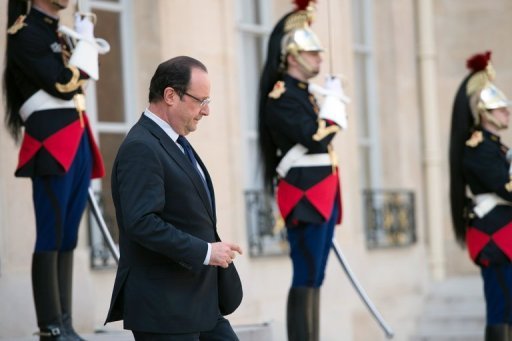President Hollande: what a difference a year makes
I can hardly believe it is just one year since François Hollande’s election. Remember the coded messages on Twitter to get around France’s reporting restrictions? The victory party at Bastille square in Paris that night, with the different coloured flags? Well, all that is recent history. This Sunday, two rival protests are taking place in Paris against Hollande: one by the radical left of Jean-Luc Mélenchon, and another by the conservative anti-gay marriage camp, angry that the bill has passed.
One year on, and Hollande is already the most unpopular French president since the current system, the Fifth Republic, was set up in 1958. His approval rating dropped this week to a record low of 24 percent. Twenty-four percent? What has the man done to deserve this? And how can he hang on for another four years?
The main reason for Hollande's disastrous poll ratings is that the economy is doing worse than a year ago. Growth has ground to a halt, and the latest EU forecast predicts France entering recession later this year. Unemployment has risen constantly for the past two years, and with over 3.2 million people out of work, it is now at a symbolic 16-year-high.
Hollande is also accused by his detractors of neglecting the economy to concentrate on social issues deemed of lesser importance, such as the gay marriage bill, which was passed in April after months of protests. The bill was one of Hollande’s campaign promises, and no doubt he never imagined that it would polarise French society the way it did.

One year after his election to the Élysée palace, Hollande’s approval ratings are at record lows. Photo: AFP.
Despite having a majority in parliament, the president’s leadership appears weak. His ministers are able to contradict each other, or his prime minister, Jean-Marc Ayrault (who is deemed uninspiring), and get away with it. These spats tend to involve Arnaud Montebourg, the minister for industrial recovery. The most memorable one was over the Florange steelworks in eastern France. Montebourg wanted to temporarily nationalise the steelworks, while Ayrault did not, and prevailed. At the time, feeling humiliated, Montebourg offered his resignation, but Hollande refused it - this despite the fact that Montebourg had insulted poor Ayrault.
Under pressure to reshuffle his cabinet or change prime minister, Hollande is faced with a classic political Catch-22: doing so would mean implicitly admitting that there is a problem with the current team.
Above all, his style seems unsuited to the current economic crisis. Hollande came to power promising to be the “Normal President”, a change from the fiery, flashy, hyperactive Nicolas Sarkozy. And in the face of constant bad news on the economic and political front, he remains consistently calm and optimistic. No doubt too calm and optimistic. In his last prime-time television appearance in March, he was asked by the interviewer why he wasn’t adopting a more Churchillian tone, given the economic gloom. “Why give them blood and tears? We need to give hope”, he replied. And, typically, Hollande asks the French to be patient. He has promised ad nauseam to reverse the rise in unemployment by the end of the year. But that goal - which the latest EU forecast now says he will not reach - is still over six months away, and the French people’s patience seems to be wearing thin.
“The Fifth Republic has difficulty functioning with two weak personalities” at its helm, right-wing opposition leader Jean-François Copé said recently, alluding to Hollande and Ayrault. How can Hollande carry on with his authority so diminished, and in a political system that was designed for a strong president, not a lame duck?
There is a precedent. The presidencies of Jacques Chirac were characterised by stagnation. Chirac will go down in history for rightly opposing the US-led invasion of Iraq, but achieved little on the home front. Similarly, Hollande has gained plaudits for intervening swiftly and decisively in Mali, but is rather less popular at home than in Timbuktu.
Yet this comparison has its limits. Chirac had charm. Charm goes a long way.




0 Comments
Post new comment